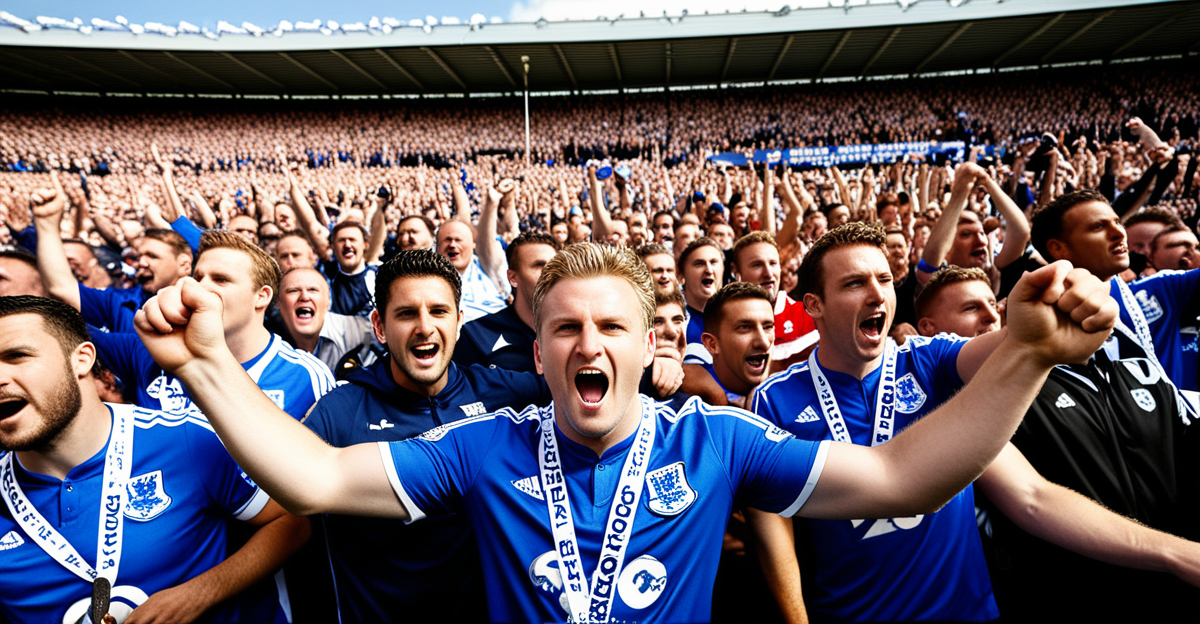Fan Support as a Foundation for Team Success
Fan support forms the backbone of many UK sports teams’ achievements. The presence of passionate fans in stadiums and arenas is not just about numbers; it’s about creating a vibrant atmosphere that uplifts player morale and strengthens team identity. When players hear the roar of a home crowd, it often fuels exceptional performances, providing that extra psychological edge needed in high-pressure situations.
The interaction between fans and athletes builds a feedback loop: dedicated supporters energize the team, which often leads to positive results that, in turn, deepen fan loyalty. This dynamic is crucial for sustained team achievements, as it fosters a shared sense of purpose and belonging.
Also to discover : What Are the Current Trends in UK Sports Physiology?
Beyond encouraging players, fan support also shapes the cultural fabric of teams. It helps establish and sustain traditions, chants, and rituals unique to each club, firmly rooting teams within their communities. Passionate support is a tangible manifestation of collective identity, making it an indispensable factor in UK sports teams’ successes. Without this enthusiastic backing, many notable achievements could lack the emotional and motivational fuel that drives teams toward victory.
Economic and Financial Impact of Fans
Fans provide essential financial backing that directly influences the success and sustainability of UK sports teams. Ticket sales form the core of this backing, often representing a significant portion of clubs’ revenues. Alongside ticketing, merchandise purchases—ranging from jerseys to memorabilia—add a valuable revenue stream, reinforcing fan support through visible team branding.
Also read : What Are the Current Trends in UK Sports Physiology?
Broadcasting rights, driven by high match attendance and fan interest, further amplify economic contributions for clubs. Media companies pay premium fees to air games that attract large audiences, underscoring the financial importance of a dedicated fan base.
The economic impact extends beyond individual clubs, producing ripple effects in local communities. Cafes, pubs, and transport services often thrive on match days thanks to fans attending games. This cycle not only bolsters club revenues but also supports wider regional economies, highlighting fans’ critical role in both sports and community vitality.
In sum, the financial input generated by fans—through ticket sales, merchandise, and broadcast interest—is foundational to team achievements. Without this economic contribution, many UK sports teams would struggle to maintain competitive operations and community engagement.
Social Media Engagement and Modern Fandom
Social media engagement has transformed fan support, expanding it beyond stadiums into the digital realm. UK sports teams now rely heavily on their digital fan base to amplify their presence and connect with supporters worldwide. Platforms like Twitter, Instagram, and TikTok enable fans to share moments, create viral content, and engage directly with teams, fostering a lively online community.
How does social media engagement benefit teams? Primarily, it enhances visibility and builds loyalty by providing constant interaction. Fans participate in polls, comment on games, and spread team culture fast, increasing overall excitement and sporadic fan recruitment.
Viral campaigns exemplify this power. For example, hashtag movements encourage fans to share photos or videos supporting their team, which multiplies online chatter and strengthens emotional ties. These efforts promote team achievements while also offering sponsors valuable exposure.
The digital fan base isn’t limited to passive observation; it actively shapes team narratives and morale. This ongoing online support complements in-person attendance, creating a comprehensive atmosphere of encouragement. In today’s sports landscape, social media engagement is crucial for UK sports teams to maintain relevance and deepen fan connections in a fast-paced world.
Home Advantage and Psychological Influence
Fan energy significantly contributes to the home advantage enjoyed by UK sports teams. The collective noise, chants, and presence of passionate supporters create an atmosphere that can intimidate opposing teams. This hostile environment often disrupts opponents’ focus, leading to lapses in concentration and performance errors. Studies show that players frequently report feeling boosted confidence and reduced anxiety when supported by a home crowd.
The psychological impact on players is profound. Seeing thousands of loyal fans react positively to good plays reinforces self-belief, while boos or cheers can influence momentum shifts. This emotional uplift often translates into improved match performance by increasing motivation and resilience under pressure. The familiarity of the home stadium and crowd also decreases stress levels, allowing athletes to execute tactics more effectively.
Importantly, home advantage isn’t purely physical or logistical; it hinges on the unwavering psychological benefit derived from fan support. Teams with consistent, vocal home crowds generally exhibit stronger performances in crucial fixtures, making fan presence an invaluable asset in the UK sports environment. This interplay emphasizes that the fans’ role extends beyond cheering—they become a vital psychological pillar influencing game outcomes.
Fans During Times of Success and Crisis
Fan loyalty stands as a crucial pillar in both team resilience and ongoing support in crisis for UK sports teams. How do fans impact a team during challenging periods? Loyal supporters maintain morale by continuing to attend matches and express encouragement, preventing players from feeling isolated. This enduring commitment often lifts teams during downturns, providing emotional stability necessary for recovery.
During winning streaks and championship runs, fan enthusiasm multiplies, creating a feedback loop that energizes players and amplifies collective confidence. The sustained cheers and celebrations fuel ambition and solidarity, reinforcing a team’s drive to maintain success.
Crucially, this loyalty isn’t conditional; fans often rally strongest when teams face adversity. Their unwavering presence sends a powerful message of belief, which can sway momentum in difficult matches. Players and coaches frequently credit passionate support as a factor in overcoming obstacles, highlighting the strategic importance of fans beyond mere attendance.
In essence, fan loyalty transcends good times, embedding itself as an emotional anchor that fosters resilience. This steadfast backing encourages UK sports teams not only to celebrate triumphs but to navigate crises with renewed determination.
Real-Life Examples and Expert Perspectives
The impact of fan support on UK sports teams is vividly illustrated through numerous real-life examples. For instance, during a critical match in the Premier League, fans’ relentless chanting inspired a last-minute comeback, directly contributing to the team’s victory. Such moments show how fan presence can alter game dynamics and outcomes.
Player interviews often emphasize the motivating power of supporters. Many athletes describe how hearing the crowd’s encouragement boosts their focus and determination. This psychological uplift isn’t just anecdotal; coaches report observable improvements in match performance when the team feels backed by its fans.
Expert commentary regularly highlights that vocal, passionate fans create an environment where players push beyond their usual limits. Sports psychologists note that this fan-induced boost increases players’ confidence and reduces stress, enhancing tactical execution.
Additionally, coaches attribute pivotal wins to the energy generated by home crowds, reiterating that fans are more than spectators—they are an active force influencing both morale and results. These insights collectively confirm that strong fan support is an indispensable component in the fabric of UK sports teams’ achievements.
Societal and Cultural Contributions of Fans
Fans play a vital role in shaping the sports culture surrounding UK sports teams. Their passionate support goes beyond the pitch, embedding itself deeply within local and national communities. By fostering rituals, chants, and traditions unique to each club, fans help build a shared community identity that unites diverse groups around a common passion.
How does this cultural impact manifest? Fans contribute actively to the social fabric by attending games and participating in club-related events, creating vibrant gatherings that reflect the team’s values. This involvement nurtures a sense of belonging, making sports a key element of everyday life for many.
The social impact of committed fandom extends to fostering inclusivity and pride, especially in neighborhoods where the team symbolizes hope and resilience. Fans often engage in charitable activities and local initiatives, further linking sports culture with broader societal well-being.
In essence, fan support goes beyond simply cheering—it sustains a living social ecosystem. This powerful connection between sports culture and community identity highlights how devoted fans fundamentally enrich UK sports teams and their surrounding regions. The energetic participation of fans fuels not only team achievements but also the cultural vitality of the UK.





